Nursing Case Study: Assessing Mr. Smith's Needs for Discharge Planning
VerifiedAdded on 2019/12/18
|8
|3324
|978
Case Study
AI Summary
This case study focuses on Mr. Smith, a 58-year-old plumber who suffered a left-sided stroke. The assignment requires an analysis of his nursing care, specifically addressing discharge planning, neurological assessments, and patient education. It involves identifying vital signs, neurological observations, and formulating targeted questions for both Mr. and Mrs. Smith to assess their needs and concerns regarding his return home. The study emphasizes the risks associated with Mr. Smith's condition, particularly dysphagia and the risk of aspiration pneumonia, and outlines strategies for mitigating these risks through patient education on safe food and fluid intake. The student is also required to design a 30-minute patient education session for Mr. and Mrs. Smith, covering the impact of the disease process on swallowing, signs of impaired swallowing, and strategies to reduce the risk of aspiration. Furthermore, the case study addresses the importance of considering the home environment, including potential risks related to the house layout and Mrs. Smith's physical limitations, in developing a comprehensive discharge plan. The assignment aims to demonstrate the student's ability to apply nursing knowledge across various subjects to provide appropriate care for Mr. Smith.
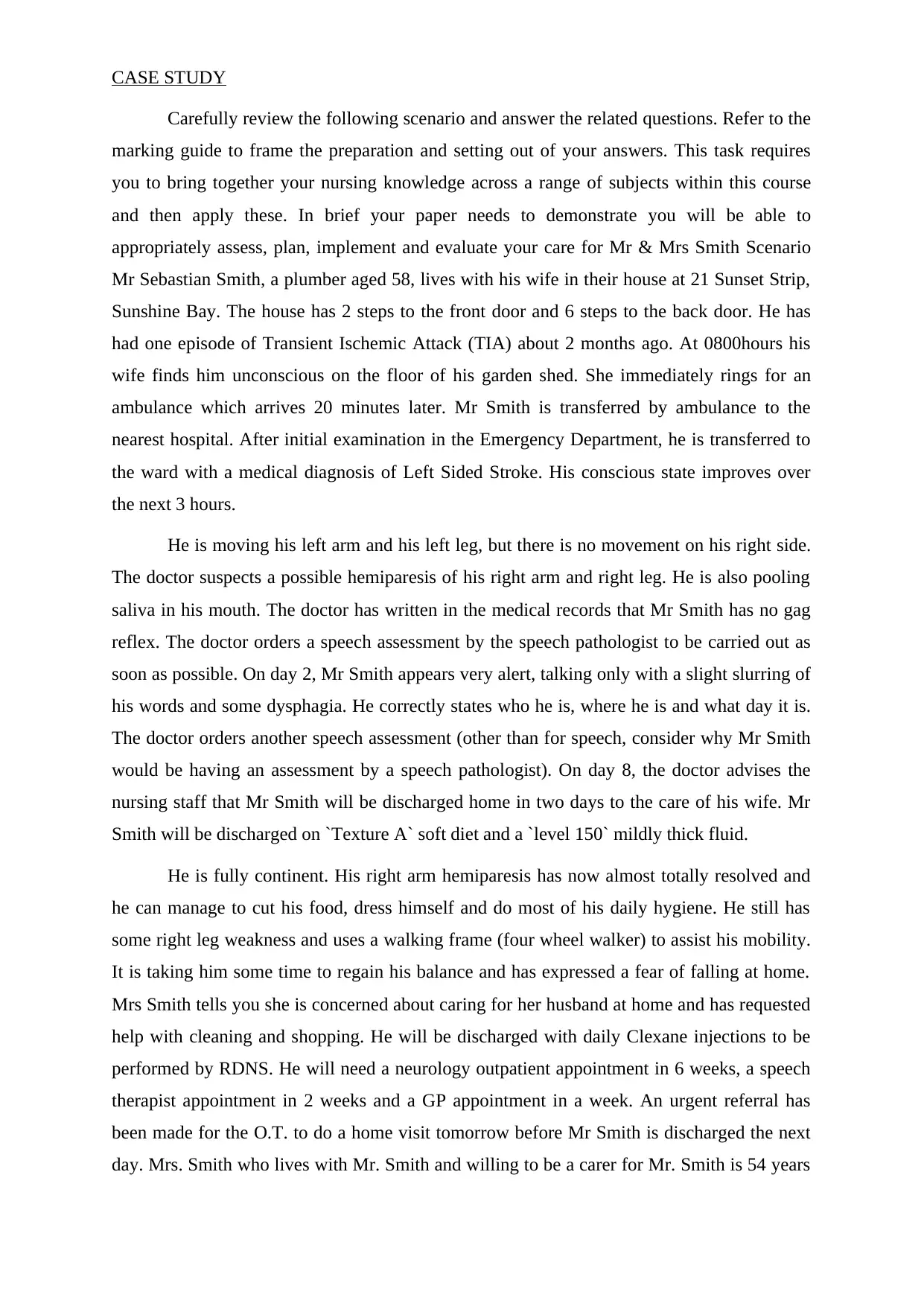
CASE STUDY
Carefully review the following scenario and answer the related questions. Refer to the
marking guide to frame the preparation and setting out of your answers. This task requires
you to bring together your nursing knowledge across a range of subjects within this course
and then apply these. In brief your paper needs to demonstrate you will be able to
appropriately assess, plan, implement and evaluate your care for Mr & Mrs Smith Scenario
Mr Sebastian Smith, a plumber aged 58, lives with his wife in their house at 21 Sunset Strip,
Sunshine Bay. The house has 2 steps to the front door and 6 steps to the back door. He has
had one episode of Transient Ischemic Attack (TIA) about 2 months ago. At 0800hours his
wife finds him unconscious on the floor of his garden shed. She immediately rings for an
ambulance which arrives 20 minutes later. Mr Smith is transferred by ambulance to the
nearest hospital. After initial examination in the Emergency Department, he is transferred to
the ward with a medical diagnosis of Left Sided Stroke. His conscious state improves over
the next 3 hours.
He is moving his left arm and his left leg, but there is no movement on his right side.
The doctor suspects a possible hemiparesis of his right arm and right leg. He is also pooling
saliva in his mouth. The doctor has written in the medical records that Mr Smith has no gag
reflex. The doctor orders a speech assessment by the speech pathologist to be carried out as
soon as possible. On day 2, Mr Smith appears very alert, talking only with a slight slurring of
his words and some dysphagia. He correctly states who he is, where he is and what day it is.
The doctor orders another speech assessment (other than for speech, consider why Mr Smith
would be having an assessment by a speech pathologist). On day 8, the doctor advises the
nursing staff that Mr Smith will be discharged home in two days to the care of his wife. Mr
Smith will be discharged on `Texture A` soft diet and a `level 150` mildly thick fluid.
He is fully continent. His right arm hemiparesis has now almost totally resolved and
he can manage to cut his food, dress himself and do most of his daily hygiene. He still has
some right leg weakness and uses a walking frame (four wheel walker) to assist his mobility.
It is taking him some time to regain his balance and has expressed a fear of falling at home.
Mrs Smith tells you she is concerned about caring for her husband at home and has requested
help with cleaning and shopping. He will be discharged with daily Clexane injections to be
performed by RDNS. He will need a neurology outpatient appointment in 6 weeks, a speech
therapist appointment in 2 weeks and a GP appointment in a week. An urgent referral has
been made for the O.T. to do a home visit tomorrow before Mr Smith is discharged the next
day. Mrs. Smith who lives with Mr. Smith and willing to be a carer for Mr. Smith is 54 years
Carefully review the following scenario and answer the related questions. Refer to the
marking guide to frame the preparation and setting out of your answers. This task requires
you to bring together your nursing knowledge across a range of subjects within this course
and then apply these. In brief your paper needs to demonstrate you will be able to
appropriately assess, plan, implement and evaluate your care for Mr & Mrs Smith Scenario
Mr Sebastian Smith, a plumber aged 58, lives with his wife in their house at 21 Sunset Strip,
Sunshine Bay. The house has 2 steps to the front door and 6 steps to the back door. He has
had one episode of Transient Ischemic Attack (TIA) about 2 months ago. At 0800hours his
wife finds him unconscious on the floor of his garden shed. She immediately rings for an
ambulance which arrives 20 minutes later. Mr Smith is transferred by ambulance to the
nearest hospital. After initial examination in the Emergency Department, he is transferred to
the ward with a medical diagnosis of Left Sided Stroke. His conscious state improves over
the next 3 hours.
He is moving his left arm and his left leg, but there is no movement on his right side.
The doctor suspects a possible hemiparesis of his right arm and right leg. He is also pooling
saliva in his mouth. The doctor has written in the medical records that Mr Smith has no gag
reflex. The doctor orders a speech assessment by the speech pathologist to be carried out as
soon as possible. On day 2, Mr Smith appears very alert, talking only with a slight slurring of
his words and some dysphagia. He correctly states who he is, where he is and what day it is.
The doctor orders another speech assessment (other than for speech, consider why Mr Smith
would be having an assessment by a speech pathologist). On day 8, the doctor advises the
nursing staff that Mr Smith will be discharged home in two days to the care of his wife. Mr
Smith will be discharged on `Texture A` soft diet and a `level 150` mildly thick fluid.
He is fully continent. His right arm hemiparesis has now almost totally resolved and
he can manage to cut his food, dress himself and do most of his daily hygiene. He still has
some right leg weakness and uses a walking frame (four wheel walker) to assist his mobility.
It is taking him some time to regain his balance and has expressed a fear of falling at home.
Mrs Smith tells you she is concerned about caring for her husband at home and has requested
help with cleaning and shopping. He will be discharged with daily Clexane injections to be
performed by RDNS. He will need a neurology outpatient appointment in 6 weeks, a speech
therapist appointment in 2 weeks and a GP appointment in a week. An urgent referral has
been made for the O.T. to do a home visit tomorrow before Mr Smith is discharged the next
day. Mrs. Smith who lives with Mr. Smith and willing to be a carer for Mr. Smith is 54 years
Paraphrase This Document
Need a fresh take? Get an instant paraphrase of this document with our AI Paraphraser
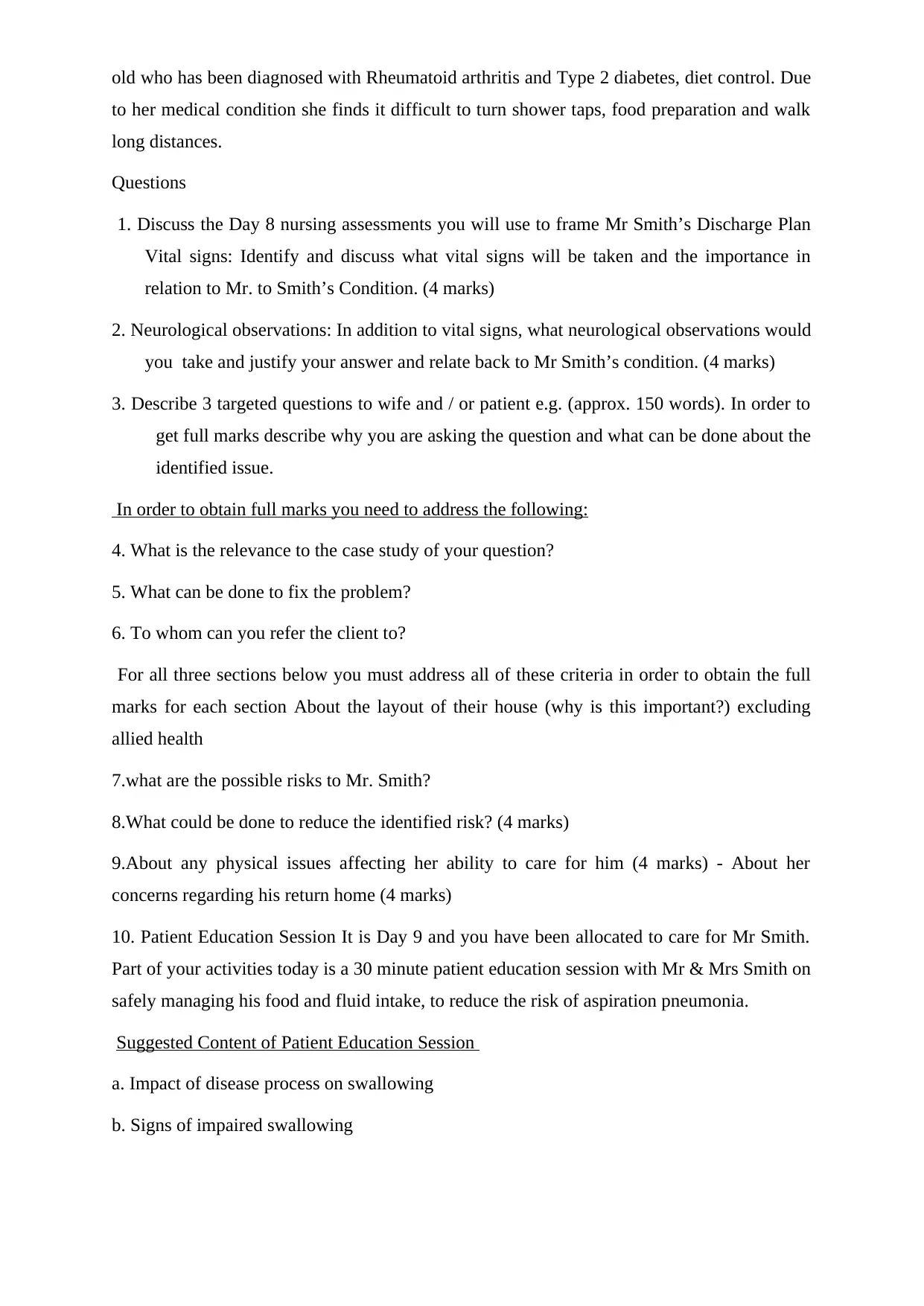
old who has been diagnosed with Rheumatoid arthritis and Type 2 diabetes, diet control. Due
to her medical condition she finds it difficult to turn shower taps, food preparation and walk
long distances.
Questions
1. Discuss the Day 8 nursing assessments you will use to frame Mr Smith’s Discharge Plan
Vital signs: Identify and discuss what vital signs will be taken and the importance in
relation to Mr. to Smith’s Condition. (4 marks)
2. Neurological observations: In addition to vital signs, what neurological observations would
you take and justify your answer and relate back to Mr Smith’s condition. (4 marks)
3. Describe 3 targeted questions to wife and / or patient e.g. (approx. 150 words). In order to
get full marks describe why you are asking the question and what can be done about the
identified issue.
In order to obtain full marks you need to address the following:
4. What is the relevance to the case study of your question?
5. What can be done to fix the problem?
6. To whom can you refer the client to?
For all three sections below you must address all of these criteria in order to obtain the full
marks for each section About the layout of their house (why is this important?) excluding
allied health
7.what are the possible risks to Mr. Smith?
8.What could be done to reduce the identified risk? (4 marks)
9.About any physical issues affecting her ability to care for him (4 marks) - About her
concerns regarding his return home (4 marks)
10. Patient Education Session It is Day 9 and you have been allocated to care for Mr Smith.
Part of your activities today is a 30 minute patient education session with Mr & Mrs Smith on
safely managing his food and fluid intake, to reduce the risk of aspiration pneumonia.
Suggested Content of Patient Education Session
a. Impact of disease process on swallowing
b. Signs of impaired swallowing
to her medical condition she finds it difficult to turn shower taps, food preparation and walk
long distances.
Questions
1. Discuss the Day 8 nursing assessments you will use to frame Mr Smith’s Discharge Plan
Vital signs: Identify and discuss what vital signs will be taken and the importance in
relation to Mr. to Smith’s Condition. (4 marks)
2. Neurological observations: In addition to vital signs, what neurological observations would
you take and justify your answer and relate back to Mr Smith’s condition. (4 marks)
3. Describe 3 targeted questions to wife and / or patient e.g. (approx. 150 words). In order to
get full marks describe why you are asking the question and what can be done about the
identified issue.
In order to obtain full marks you need to address the following:
4. What is the relevance to the case study of your question?
5. What can be done to fix the problem?
6. To whom can you refer the client to?
For all three sections below you must address all of these criteria in order to obtain the full
marks for each section About the layout of their house (why is this important?) excluding
allied health
7.what are the possible risks to Mr. Smith?
8.What could be done to reduce the identified risk? (4 marks)
9.About any physical issues affecting her ability to care for him (4 marks) - About her
concerns regarding his return home (4 marks)
10. Patient Education Session It is Day 9 and you have been allocated to care for Mr Smith.
Part of your activities today is a 30 minute patient education session with Mr & Mrs Smith on
safely managing his food and fluid intake, to reduce the risk of aspiration pneumonia.
Suggested Content of Patient Education Session
a. Impact of disease process on swallowing
b. Signs of impaired swallowing
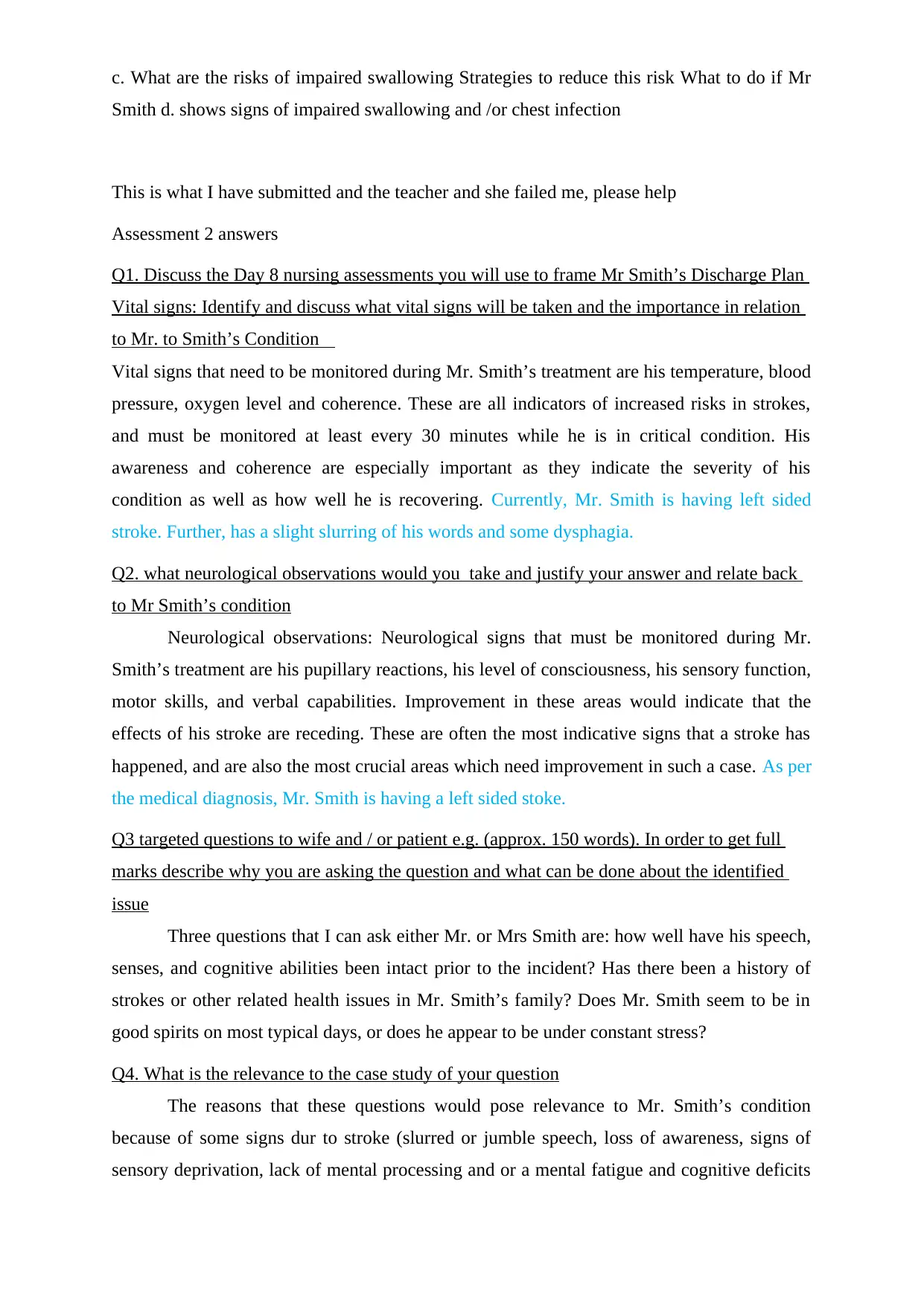
c. What are the risks of impaired swallowing Strategies to reduce this risk What to do if Mr
Smith d. shows signs of impaired swallowing and /or chest infection
This is what I have submitted and the teacher and she failed me, please help
Assessment 2 answers
Q1. Discuss the Day 8 nursing assessments you will use to frame Mr Smith’s Discharge Plan
Vital signs: Identify and discuss what vital signs will be taken and the importance in relation
to Mr. to Smith’s Condition
Vital signs that need to be monitored during Mr. Smith’s treatment are his temperature, blood
pressure, oxygen level and coherence. These are all indicators of increased risks in strokes,
and must be monitored at least every 30 minutes while he is in critical condition. His
awareness and coherence are especially important as they indicate the severity of his
condition as well as how well he is recovering. Currently, Mr. Smith is having left sided
stroke. Further, has a slight slurring of his words and some dysphagia.
Q2. what neurological observations would you take and justify your answer and relate back
to Mr Smith’s condition
Neurological observations: Neurological signs that must be monitored during Mr.
Smith’s treatment are his pupillary reactions, his level of consciousness, his sensory function,
motor skills, and verbal capabilities. Improvement in these areas would indicate that the
effects of his stroke are receding. These are often the most indicative signs that a stroke has
happened, and are also the most crucial areas which need improvement in such a case. As per
the medical diagnosis, Mr. Smith is having a left sided stoke.
Q3 targeted questions to wife and / or patient e.g. (approx. 150 words). In order to get full
marks describe why you are asking the question and what can be done about the identified
issue
Three questions that I can ask either Mr. or Mrs Smith are: how well have his speech,
senses, and cognitive abilities been intact prior to the incident? Has there been a history of
strokes or other related health issues in Mr. Smith’s family? Does Mr. Smith seem to be in
good spirits on most typical days, or does he appear to be under constant stress?
Q4. What is the relevance to the case study of your question
The reasons that these questions would pose relevance to Mr. Smith’s condition
because of some signs dur to stroke (slurred or jumble speech, loss of awareness, signs of
sensory deprivation, lack of mental processing and or a mental fatigue and cognitive deficits
Smith d. shows signs of impaired swallowing and /or chest infection
This is what I have submitted and the teacher and she failed me, please help
Assessment 2 answers
Q1. Discuss the Day 8 nursing assessments you will use to frame Mr Smith’s Discharge Plan
Vital signs: Identify and discuss what vital signs will be taken and the importance in relation
to Mr. to Smith’s Condition
Vital signs that need to be monitored during Mr. Smith’s treatment are his temperature, blood
pressure, oxygen level and coherence. These are all indicators of increased risks in strokes,
and must be monitored at least every 30 minutes while he is in critical condition. His
awareness and coherence are especially important as they indicate the severity of his
condition as well as how well he is recovering. Currently, Mr. Smith is having left sided
stroke. Further, has a slight slurring of his words and some dysphagia.
Q2. what neurological observations would you take and justify your answer and relate back
to Mr Smith’s condition
Neurological observations: Neurological signs that must be monitored during Mr.
Smith’s treatment are his pupillary reactions, his level of consciousness, his sensory function,
motor skills, and verbal capabilities. Improvement in these areas would indicate that the
effects of his stroke are receding. These are often the most indicative signs that a stroke has
happened, and are also the most crucial areas which need improvement in such a case. As per
the medical diagnosis, Mr. Smith is having a left sided stoke.
Q3 targeted questions to wife and / or patient e.g. (approx. 150 words). In order to get full
marks describe why you are asking the question and what can be done about the identified
issue
Three questions that I can ask either Mr. or Mrs Smith are: how well have his speech,
senses, and cognitive abilities been intact prior to the incident? Has there been a history of
strokes or other related health issues in Mr. Smith’s family? Does Mr. Smith seem to be in
good spirits on most typical days, or does he appear to be under constant stress?
Q4. What is the relevance to the case study of your question
The reasons that these questions would pose relevance to Mr. Smith’s condition
because of some signs dur to stroke (slurred or jumble speech, loss of awareness, signs of
sensory deprivation, lack of mental processing and or a mental fatigue and cognitive deficits
⊘ This is a preview!⊘
Do you want full access?
Subscribe today to unlock all pages.

Trusted by 1+ million students worldwide
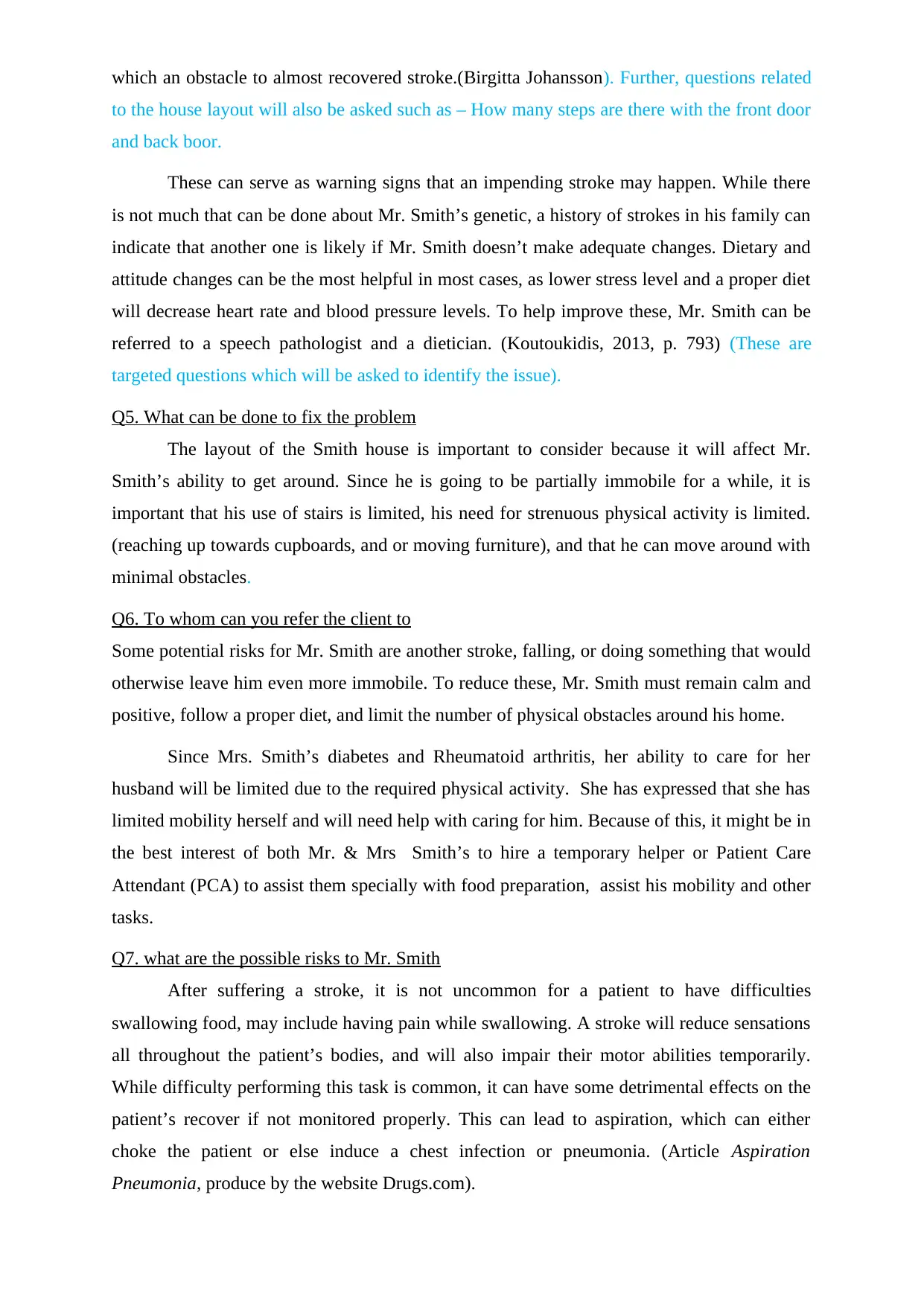
which an obstacle to almost recovered stroke.(Birgitta Johansson). Further, questions related
to the house layout will also be asked such as – How many steps are there with the front door
and back boor.
These can serve as warning signs that an impending stroke may happen. While there
is not much that can be done about Mr. Smith’s genetic, a history of strokes in his family can
indicate that another one is likely if Mr. Smith doesn’t make adequate changes. Dietary and
attitude changes can be the most helpful in most cases, as lower stress level and a proper diet
will decrease heart rate and blood pressure levels. To help improve these, Mr. Smith can be
referred to a speech pathologist and a dietician. (Koutoukidis, 2013, p. 793) (These are
targeted questions which will be asked to identify the issue).
Q5. What can be done to fix the problem
The layout of the Smith house is important to consider because it will affect Mr.
Smith’s ability to get around. Since he is going to be partially immobile for a while, it is
important that his use of stairs is limited, his need for strenuous physical activity is limited.
(reaching up towards cupboards, and or moving furniture), and that he can move around with
minimal obstacles.
Q6. To whom can you refer the client to
Some potential risks for Mr. Smith are another stroke, falling, or doing something that would
otherwise leave him even more immobile. To reduce these, Mr. Smith must remain calm and
positive, follow a proper diet, and limit the number of physical obstacles around his home.
Since Mrs. Smith’s diabetes and Rheumatoid arthritis, her ability to care for her
husband will be limited due to the required physical activity. She has expressed that she has
limited mobility herself and will need help with caring for him. Because of this, it might be in
the best interest of both Mr. & Mrs Smith’s to hire a temporary helper or Patient Care
Attendant (PCA) to assist them specially with food preparation, assist his mobility and other
tasks.
Q7. what are the possible risks to Mr. Smith
After suffering a stroke, it is not uncommon for a patient to have difficulties
swallowing food, may include having pain while swallowing. A stroke will reduce sensations
all throughout the patient’s bodies, and will also impair their motor abilities temporarily.
While difficulty performing this task is common, it can have some detrimental effects on the
patient’s recover if not monitored properly. This can lead to aspiration, which can either
choke the patient or else induce a chest infection or pneumonia. (Article Aspiration
Pneumonia, produce by the website Drugs.com).
to the house layout will also be asked such as – How many steps are there with the front door
and back boor.
These can serve as warning signs that an impending stroke may happen. While there
is not much that can be done about Mr. Smith’s genetic, a history of strokes in his family can
indicate that another one is likely if Mr. Smith doesn’t make adequate changes. Dietary and
attitude changes can be the most helpful in most cases, as lower stress level and a proper diet
will decrease heart rate and blood pressure levels. To help improve these, Mr. Smith can be
referred to a speech pathologist and a dietician. (Koutoukidis, 2013, p. 793) (These are
targeted questions which will be asked to identify the issue).
Q5. What can be done to fix the problem
The layout of the Smith house is important to consider because it will affect Mr.
Smith’s ability to get around. Since he is going to be partially immobile for a while, it is
important that his use of stairs is limited, his need for strenuous physical activity is limited.
(reaching up towards cupboards, and or moving furniture), and that he can move around with
minimal obstacles.
Q6. To whom can you refer the client to
Some potential risks for Mr. Smith are another stroke, falling, or doing something that would
otherwise leave him even more immobile. To reduce these, Mr. Smith must remain calm and
positive, follow a proper diet, and limit the number of physical obstacles around his home.
Since Mrs. Smith’s diabetes and Rheumatoid arthritis, her ability to care for her
husband will be limited due to the required physical activity. She has expressed that she has
limited mobility herself and will need help with caring for him. Because of this, it might be in
the best interest of both Mr. & Mrs Smith’s to hire a temporary helper or Patient Care
Attendant (PCA) to assist them specially with food preparation, assist his mobility and other
tasks.
Q7. what are the possible risks to Mr. Smith
After suffering a stroke, it is not uncommon for a patient to have difficulties
swallowing food, may include having pain while swallowing. A stroke will reduce sensations
all throughout the patient’s bodies, and will also impair their motor abilities temporarily.
While difficulty performing this task is common, it can have some detrimental effects on the
patient’s recover if not monitored properly. This can lead to aspiration, which can either
choke the patient or else induce a chest infection or pneumonia. (Article Aspiration
Pneumonia, produce by the website Drugs.com).
Paraphrase This Document
Need a fresh take? Get an instant paraphrase of this document with our AI Paraphraser
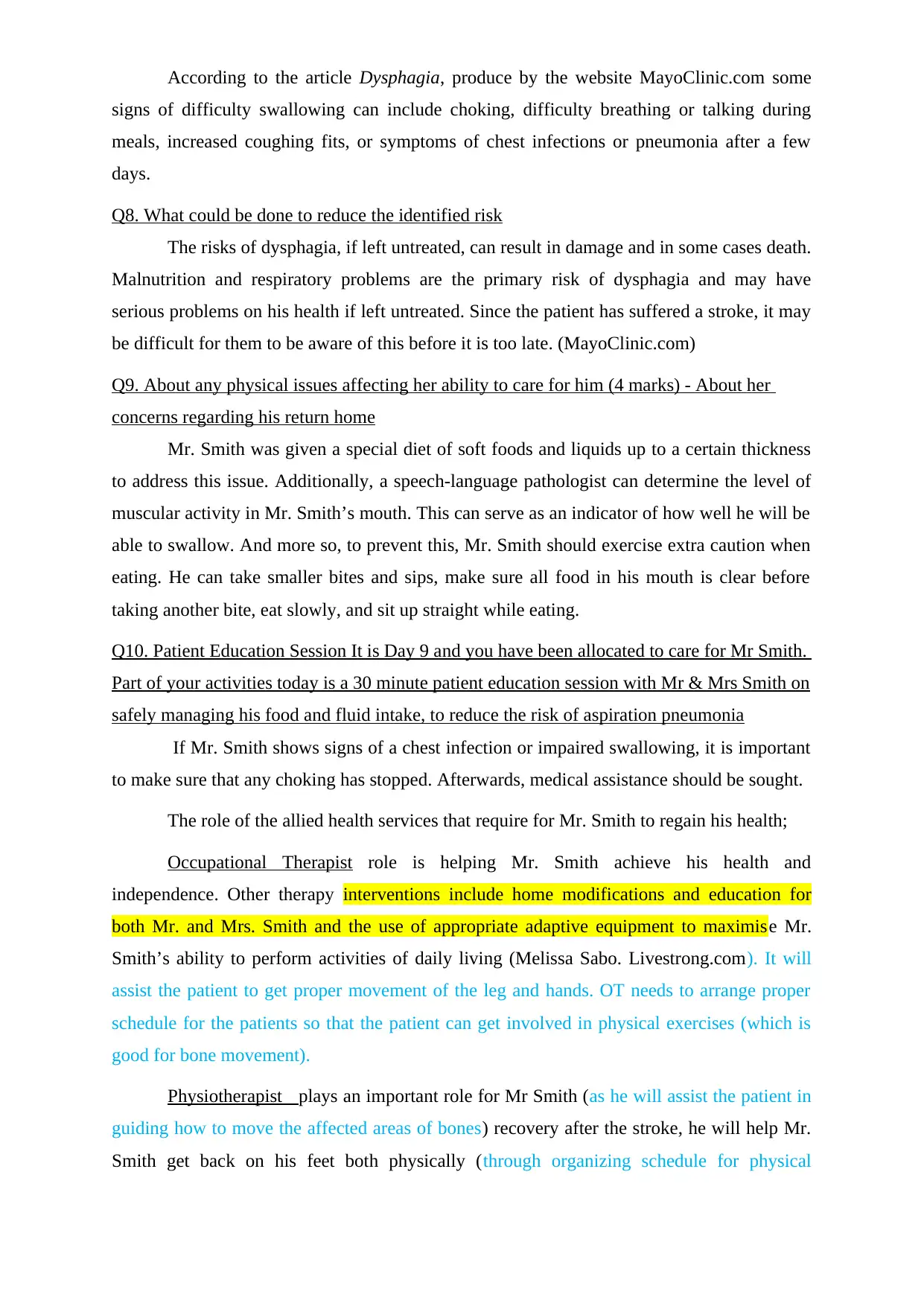
According to the article Dysphagia, produce by the website MayoClinic.com some
signs of difficulty swallowing can include choking, difficulty breathing or talking during
meals, increased coughing fits, or symptoms of chest infections or pneumonia after a few
days.
Q8. What could be done to reduce the identified risk
The risks of dysphagia, if left untreated, can result in damage and in some cases death.
Malnutrition and respiratory problems are the primary risk of dysphagia and may have
serious problems on his health if left untreated. Since the patient has suffered a stroke, it may
be difficult for them to be aware of this before it is too late. (MayoClinic.com)
Q9. About any physical issues affecting her ability to care for him (4 marks) - About her
concerns regarding his return home
Mr. Smith was given a special diet of soft foods and liquids up to a certain thickness
to address this issue. Additionally, a speech-language pathologist can determine the level of
muscular activity in Mr. Smith’s mouth. This can serve as an indicator of how well he will be
able to swallow. And more so, to prevent this, Mr. Smith should exercise extra caution when
eating. He can take smaller bites and sips, make sure all food in his mouth is clear before
taking another bite, eat slowly, and sit up straight while eating.
Q10. Patient Education Session It is Day 9 and you have been allocated to care for Mr Smith.
Part of your activities today is a 30 minute patient education session with Mr & Mrs Smith on
safely managing his food and fluid intake, to reduce the risk of aspiration pneumonia
If Mr. Smith shows signs of a chest infection or impaired swallowing, it is important
to make sure that any choking has stopped. Afterwards, medical assistance should be sought.
The role of the allied health services that require for Mr. Smith to regain his health;
Occupational Therapist role is helping Mr. Smith achieve his health and
independence. Other therapy interventions include home modifications and education for
both Mr. and Mrs. Smith and the use of appropriate adaptive equipment to maximise Mr.
Smith’s ability to perform activities of daily living (Melissa Sabo. Livestrong.com). It will
assist the patient to get proper movement of the leg and hands. OT needs to arrange proper
schedule for the patients so that the patient can get involved in physical exercises (which is
good for bone movement).
Physiotherapist plays an important role for Mr Smith (as he will assist the patient in
guiding how to move the affected areas of bones) recovery after the stroke, he will help Mr.
Smith get back on his feet both physically (through organizing schedule for physical
signs of difficulty swallowing can include choking, difficulty breathing or talking during
meals, increased coughing fits, or symptoms of chest infections or pneumonia after a few
days.
Q8. What could be done to reduce the identified risk
The risks of dysphagia, if left untreated, can result in damage and in some cases death.
Malnutrition and respiratory problems are the primary risk of dysphagia and may have
serious problems on his health if left untreated. Since the patient has suffered a stroke, it may
be difficult for them to be aware of this before it is too late. (MayoClinic.com)
Q9. About any physical issues affecting her ability to care for him (4 marks) - About her
concerns regarding his return home
Mr. Smith was given a special diet of soft foods and liquids up to a certain thickness
to address this issue. Additionally, a speech-language pathologist can determine the level of
muscular activity in Mr. Smith’s mouth. This can serve as an indicator of how well he will be
able to swallow. And more so, to prevent this, Mr. Smith should exercise extra caution when
eating. He can take smaller bites and sips, make sure all food in his mouth is clear before
taking another bite, eat slowly, and sit up straight while eating.
Q10. Patient Education Session It is Day 9 and you have been allocated to care for Mr Smith.
Part of your activities today is a 30 minute patient education session with Mr & Mrs Smith on
safely managing his food and fluid intake, to reduce the risk of aspiration pneumonia
If Mr. Smith shows signs of a chest infection or impaired swallowing, it is important
to make sure that any choking has stopped. Afterwards, medical assistance should be sought.
The role of the allied health services that require for Mr. Smith to regain his health;
Occupational Therapist role is helping Mr. Smith achieve his health and
independence. Other therapy interventions include home modifications and education for
both Mr. and Mrs. Smith and the use of appropriate adaptive equipment to maximise Mr.
Smith’s ability to perform activities of daily living (Melissa Sabo. Livestrong.com). It will
assist the patient to get proper movement of the leg and hands. OT needs to arrange proper
schedule for the patients so that the patient can get involved in physical exercises (which is
good for bone movement).
Physiotherapist plays an important role for Mr Smith (as he will assist the patient in
guiding how to move the affected areas of bones) recovery after the stroke, he will help Mr.
Smith get back on his feet both physically (through organizing schedule for physical
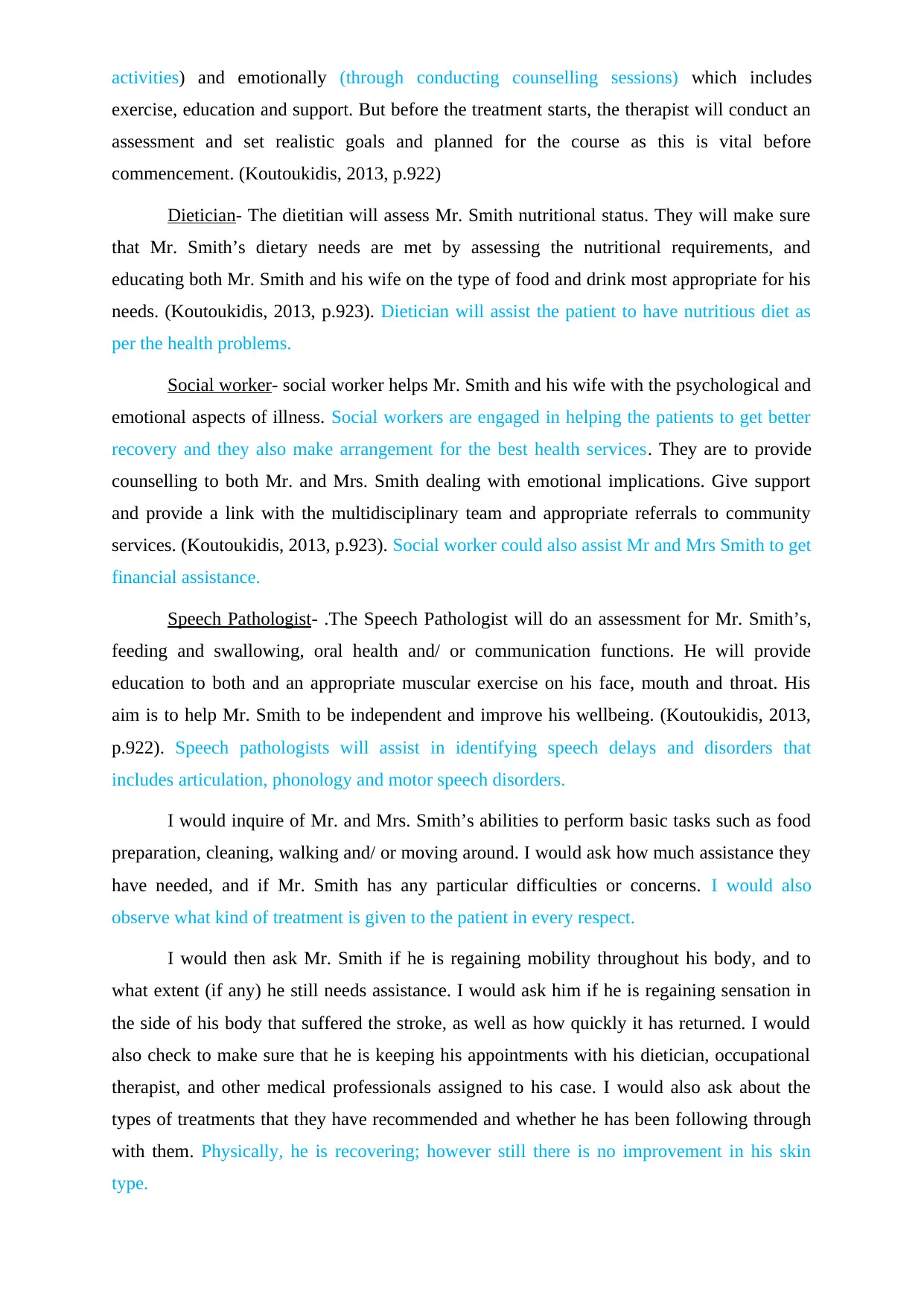
activities) and emotionally (through conducting counselling sessions) which includes
exercise, education and support. But before the treatment starts, the therapist will conduct an
assessment and set realistic goals and planned for the course as this is vital before
commencement. (Koutoukidis, 2013, p.922)
Dietician- The dietitian will assess Mr. Smith nutritional status. They will make sure
that Mr. Smith’s dietary needs are met by assessing the nutritional requirements, and
educating both Mr. Smith and his wife on the type of food and drink most appropriate for his
needs. (Koutoukidis, 2013, p.923). Dietician will assist the patient to have nutritious diet as
per the health problems.
Social worker- social worker helps Mr. Smith and his wife with the psychological and
emotional aspects of illness. Social workers are engaged in helping the patients to get better
recovery and they also make arrangement for the best health services. They are to provide
counselling to both Mr. and Mrs. Smith dealing with emotional implications. Give support
and provide a link with the multidisciplinary team and appropriate referrals to community
services. (Koutoukidis, 2013, p.923). Social worker could also assist Mr and Mrs Smith to get
financial assistance.
Speech Pathologist- .The Speech Pathologist will do an assessment for Mr. Smith’s,
feeding and swallowing, oral health and/ or communication functions. He will provide
education to both and an appropriate muscular exercise on his face, mouth and throat. His
aim is to help Mr. Smith to be independent and improve his wellbeing. (Koutoukidis, 2013,
p.922). Speech pathologists will assist in identifying speech delays and disorders that
includes articulation, phonology and motor speech disorders.
I would inquire of Mr. and Mrs. Smith’s abilities to perform basic tasks such as food
preparation, cleaning, walking and/ or moving around. I would ask how much assistance they
have needed, and if Mr. Smith has any particular difficulties or concerns. I would also
observe what kind of treatment is given to the patient in every respect.
I would then ask Mr. Smith if he is regaining mobility throughout his body, and to
what extent (if any) he still needs assistance. I would ask him if he is regaining sensation in
the side of his body that suffered the stroke, as well as how quickly it has returned. I would
also check to make sure that he is keeping his appointments with his dietician, occupational
therapist, and other medical professionals assigned to his case. I would also ask about the
types of treatments that they have recommended and whether he has been following through
with them. Physically, he is recovering; however still there is no improvement in his skin
type.
exercise, education and support. But before the treatment starts, the therapist will conduct an
assessment and set realistic goals and planned for the course as this is vital before
commencement. (Koutoukidis, 2013, p.922)
Dietician- The dietitian will assess Mr. Smith nutritional status. They will make sure
that Mr. Smith’s dietary needs are met by assessing the nutritional requirements, and
educating both Mr. Smith and his wife on the type of food and drink most appropriate for his
needs. (Koutoukidis, 2013, p.923). Dietician will assist the patient to have nutritious diet as
per the health problems.
Social worker- social worker helps Mr. Smith and his wife with the psychological and
emotional aspects of illness. Social workers are engaged in helping the patients to get better
recovery and they also make arrangement for the best health services. They are to provide
counselling to both Mr. and Mrs. Smith dealing with emotional implications. Give support
and provide a link with the multidisciplinary team and appropriate referrals to community
services. (Koutoukidis, 2013, p.923). Social worker could also assist Mr and Mrs Smith to get
financial assistance.
Speech Pathologist- .The Speech Pathologist will do an assessment for Mr. Smith’s,
feeding and swallowing, oral health and/ or communication functions. He will provide
education to both and an appropriate muscular exercise on his face, mouth and throat. His
aim is to help Mr. Smith to be independent and improve his wellbeing. (Koutoukidis, 2013,
p.922). Speech pathologists will assist in identifying speech delays and disorders that
includes articulation, phonology and motor speech disorders.
I would inquire of Mr. and Mrs. Smith’s abilities to perform basic tasks such as food
preparation, cleaning, walking and/ or moving around. I would ask how much assistance they
have needed, and if Mr. Smith has any particular difficulties or concerns. I would also
observe what kind of treatment is given to the patient in every respect.
I would then ask Mr. Smith if he is regaining mobility throughout his body, and to
what extent (if any) he still needs assistance. I would ask him if he is regaining sensation in
the side of his body that suffered the stroke, as well as how quickly it has returned. I would
also check to make sure that he is keeping his appointments with his dietician, occupational
therapist, and other medical professionals assigned to his case. I would also ask about the
types of treatments that they have recommended and whether he has been following through
with them. Physically, he is recovering; however still there is no improvement in his skin
type.
⊘ This is a preview!⊘
Do you want full access?
Subscribe today to unlock all pages.

Trusted by 1+ million students worldwide

Since stress levels and coping mechanisms are important to consider with stroke victims, I
would ask how the mental states of Mr. and Mrs. Smith have been since his return home.
Cognizance is a crucial indicator to consider, as it indicates whether the patient’s mental
functions are returning properly. As observed, it can be said that Mr. Smith has stress related
issues and he is also having some issues in movement of legs and hands.
Based on their responses, I would recommend that they keep an eye on his physical
recovery, his ability to speak, move, eat, and cope with his condition, and that certain vital
signs that may be showing minimal improvement. Proper monitoring is required as Mr. Smith
has high risk of falls, pneumonia and depression. Thus, a clear controlling timetable will be
followed.
would ask how the mental states of Mr. and Mrs. Smith have been since his return home.
Cognizance is a crucial indicator to consider, as it indicates whether the patient’s mental
functions are returning properly. As observed, it can be said that Mr. Smith has stress related
issues and he is also having some issues in movement of legs and hands.
Based on their responses, I would recommend that they keep an eye on his physical
recovery, his ability to speak, move, eat, and cope with his condition, and that certain vital
signs that may be showing minimal improvement. Proper monitoring is required as Mr. Smith
has high risk of falls, pneumonia and depression. Thus, a clear controlling timetable will be
followed.
Paraphrase This Document
Need a fresh take? Get an instant paraphrase of this document with our AI Paraphraser
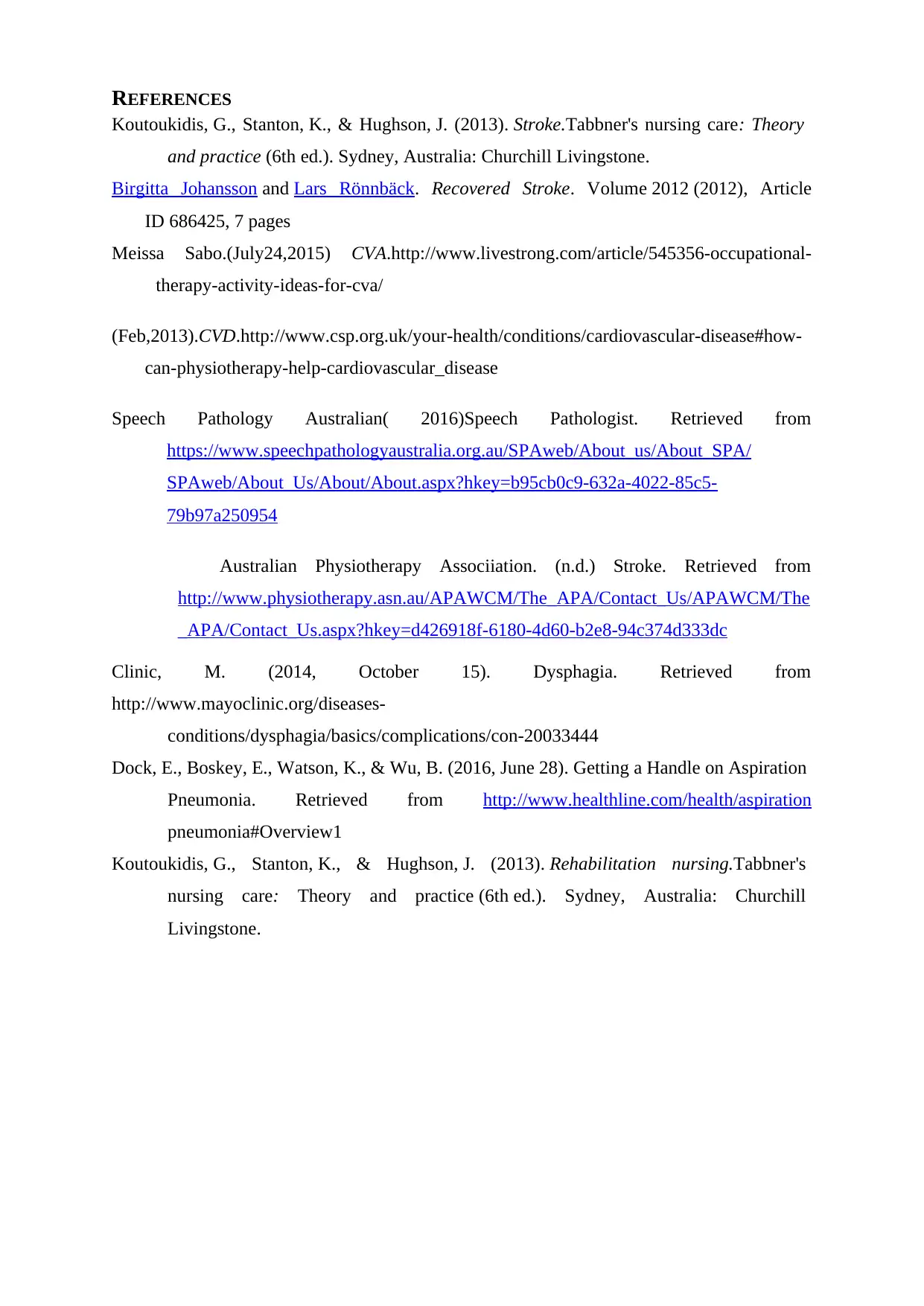
REFERENCES
Koutoukidis, G., Stanton, K., & Hughson, J. (2013). Stroke.Tabbner's nursing care: Theory
and practice (6th ed.). Sydney, Australia: Churchill Livingstone.
Birgitta Johansson and Lars Rönnbäck. Recovered Stroke. Volume 2012 (2012), Article
ID 686425, 7 pages
Meissa Sabo.(July24,2015) CVA.http://www.livestrong.com/article/545356-occupational-
therapy-activity-ideas-for-cva/
(Feb,2013).CVD.http://www.csp.org.uk/your-health/conditions/cardiovascular-disease#how-
can-physiotherapy-help-cardiovascular_disease
Speech Pathology Australian( 2016)Speech Pathologist. Retrieved from
https://www.speechpathologyaustralia.org.au/SPAweb/About_us/About_SPA/
SPAweb/About_Us/About/About.aspx?hkey=b95cb0c9-632a-4022-85c5-
79b97a250954
Australian Physiotherapy Associiation. (n.d.) Stroke. Retrieved from
http://www.physiotherapy.asn.au/APAWCM/The_APA/Contact_Us/APAWCM/The
_APA/Contact_Us.aspx?hkey=d426918f-6180-4d60-b2e8-94c374d333dc
Clinic, M. (2014, October 15). Dysphagia. Retrieved from
http://www.mayoclinic.org/diseases-
conditions/dysphagia/basics/complications/con-20033444
Dock, E., Boskey, E., Watson, K., & Wu, B. (2016, June 28). Getting a Handle on Aspiration
Pneumonia. Retrieved from http://www.healthline.com/health/aspiration
pneumonia#Overview1
Koutoukidis, G., Stanton, K., & Hughson, J. (2013). Rehabilitation nursing.Tabbner's
nursing care: Theory and practice (6th ed.). Sydney, Australia: Churchill
Livingstone.
Koutoukidis, G., Stanton, K., & Hughson, J. (2013). Stroke.Tabbner's nursing care: Theory
and practice (6th ed.). Sydney, Australia: Churchill Livingstone.
Birgitta Johansson and Lars Rönnbäck. Recovered Stroke. Volume 2012 (2012), Article
ID 686425, 7 pages
Meissa Sabo.(July24,2015) CVA.http://www.livestrong.com/article/545356-occupational-
therapy-activity-ideas-for-cva/
(Feb,2013).CVD.http://www.csp.org.uk/your-health/conditions/cardiovascular-disease#how-
can-physiotherapy-help-cardiovascular_disease
Speech Pathology Australian( 2016)Speech Pathologist. Retrieved from
https://www.speechpathologyaustralia.org.au/SPAweb/About_us/About_SPA/
SPAweb/About_Us/About/About.aspx?hkey=b95cb0c9-632a-4022-85c5-
79b97a250954
Australian Physiotherapy Associiation. (n.d.) Stroke. Retrieved from
http://www.physiotherapy.asn.au/APAWCM/The_APA/Contact_Us/APAWCM/The
_APA/Contact_Us.aspx?hkey=d426918f-6180-4d60-b2e8-94c374d333dc
Clinic, M. (2014, October 15). Dysphagia. Retrieved from
http://www.mayoclinic.org/diseases-
conditions/dysphagia/basics/complications/con-20033444
Dock, E., Boskey, E., Watson, K., & Wu, B. (2016, June 28). Getting a Handle on Aspiration
Pneumonia. Retrieved from http://www.healthline.com/health/aspiration
pneumonia#Overview1
Koutoukidis, G., Stanton, K., & Hughson, J. (2013). Rehabilitation nursing.Tabbner's
nursing care: Theory and practice (6th ed.). Sydney, Australia: Churchill
Livingstone.
1 out of 8
Related Documents
Your All-in-One AI-Powered Toolkit for Academic Success.
+13062052269
info@desklib.com
Available 24*7 on WhatsApp / Email
![[object Object]](/_next/static/media/star-bottom.7253800d.svg)
Unlock your academic potential
Copyright © 2020–2026 A2Z Services. All Rights Reserved. Developed and managed by ZUCOL.





